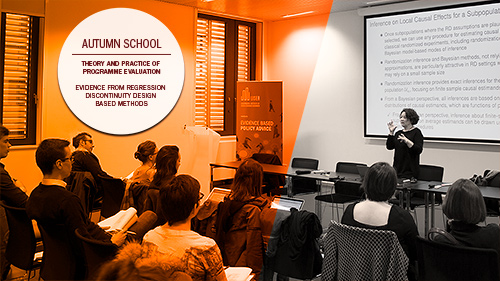News
Autumn School @ LISER: Supporting aspiring researchers & PhD Students
Boosting evidence-based European policies for Inclusive Growth
Important empirical questions in labour economics, public finance, industrial organisation, and other areas of social sciences depend on causal effects of public policies. In the last decades, many research studies have been developed on the econometric and statistical analysis of such causal effects

In the framework of the transversal activity, the Autumn School “Theory and Practice of Programme Evaluation: Regression Discontinuity Design (RDD) based methods” was held at LISER on 9-10 November 2016. The workshop, organized by Michela Bia - team leader of the Evaluation Unit - was co-sponsored by the Inclusive Growth Research Infrastructure Diffusion (INGRID project: see below).
Important empirical questions in labour economics, public finance, industrial organisation, and other areas of social sciences depend on causal effects of public policies. In the last decades, many research studies have been developed on the econometric and statistical analysis of such causal effects.

Along these lines, this Autumn School aimed at providing the audience with the fundamental principles in impact evaluation, also discussing some of the most recent developments in this framework with a focus on Regression Discontinuity Design. The speakers, Prof. Fabrizia Mealli and Prof. Alessandra Mattei, were very responsive and pitched the course at a level that was appropriate for all participants attending the workshop. Moreover, the combination of methodological aspects and empirical studies was appreciated by all as extremely original and informative. PhD students and young researchers, coming from Spain, Italy, Portugal, United Kingdom, Germany, Luxembourg, Belgium, and Netherlands, found the workshop a unique opportunity to build capacity and network in an important field of both scientific and policy relevance. It has amplified the international visibility of LISER in the context of programme evaluation, and strengthened the international research contacts for future projects in the field of public policy studies.
The InGRID project is funded by the European Union’s Seventh Framework Programme for Research, Technological Development and Demonstration under Grant Agreement No 312691 and involves 17 European partners. Referring to the EU2020-ambition of Inclusive Growth, the general objectives of InGRID are to integrate and to innovate existing, but distributed European social sciences research infrastructures on ‘Poverty and Living Conditions’ and ‘Working Conditions and Vulnerability’ by providing transnational data access, organising mutual knowledge exchange activities and improving methods and tools for comparative research. This integration will provide the related European scientific community with new and better opportunities to fulfil its key role in the development of evidence-based European policies for Inclusive Growth.






